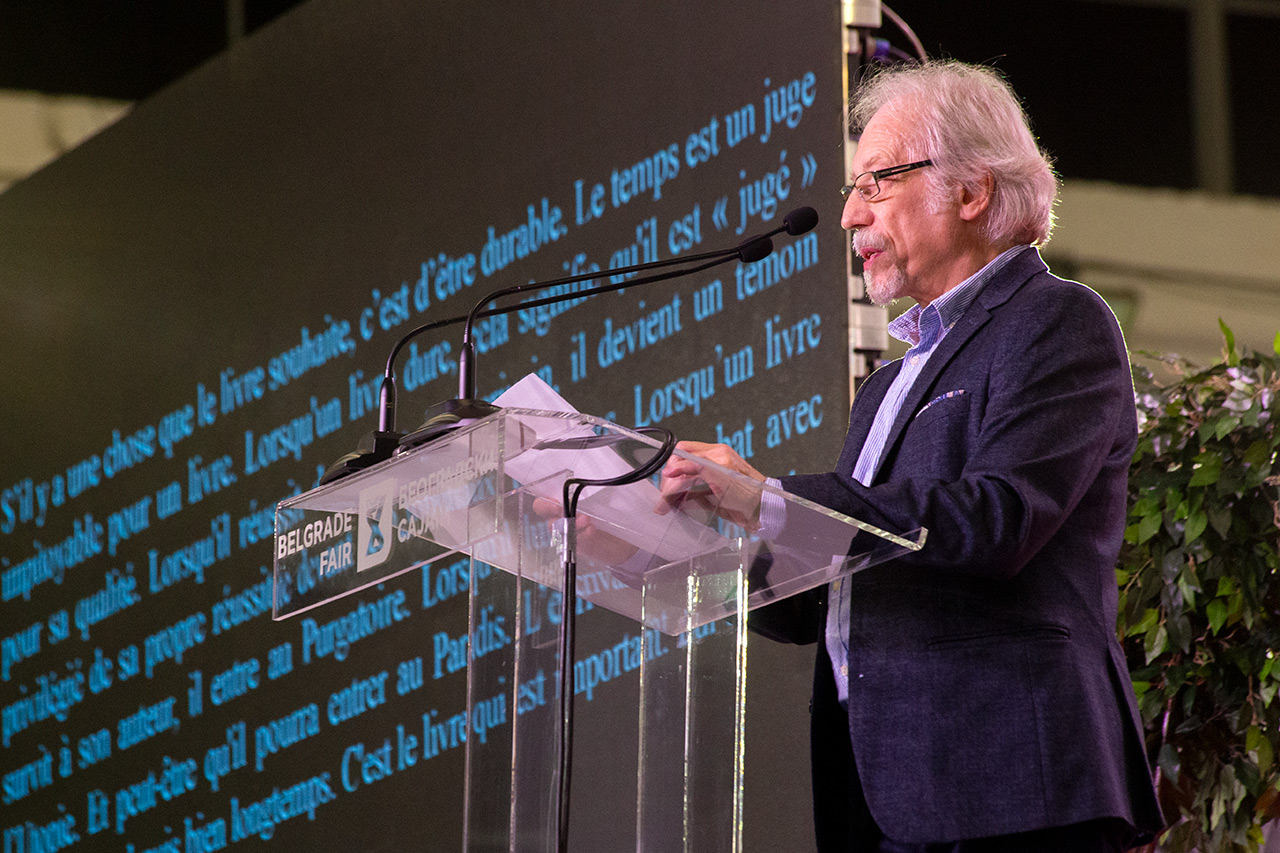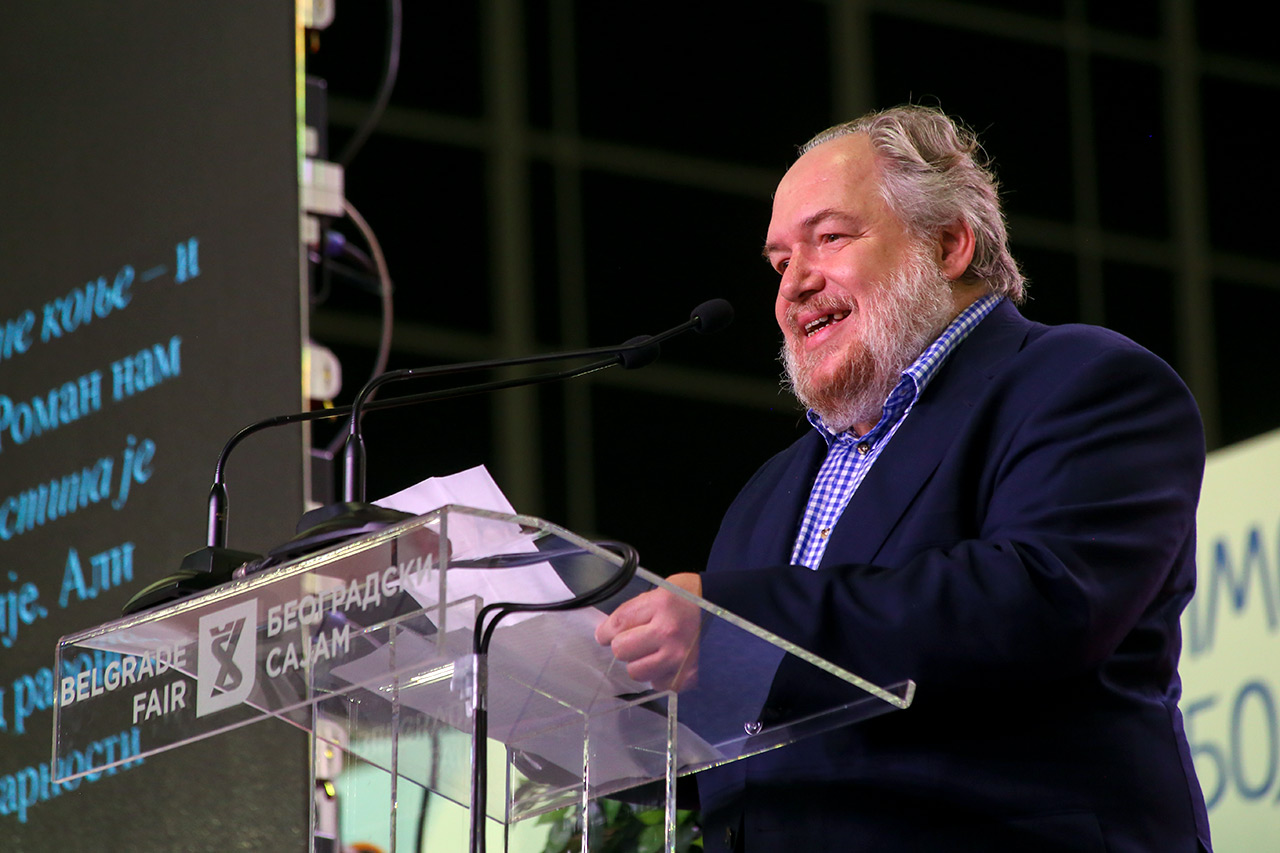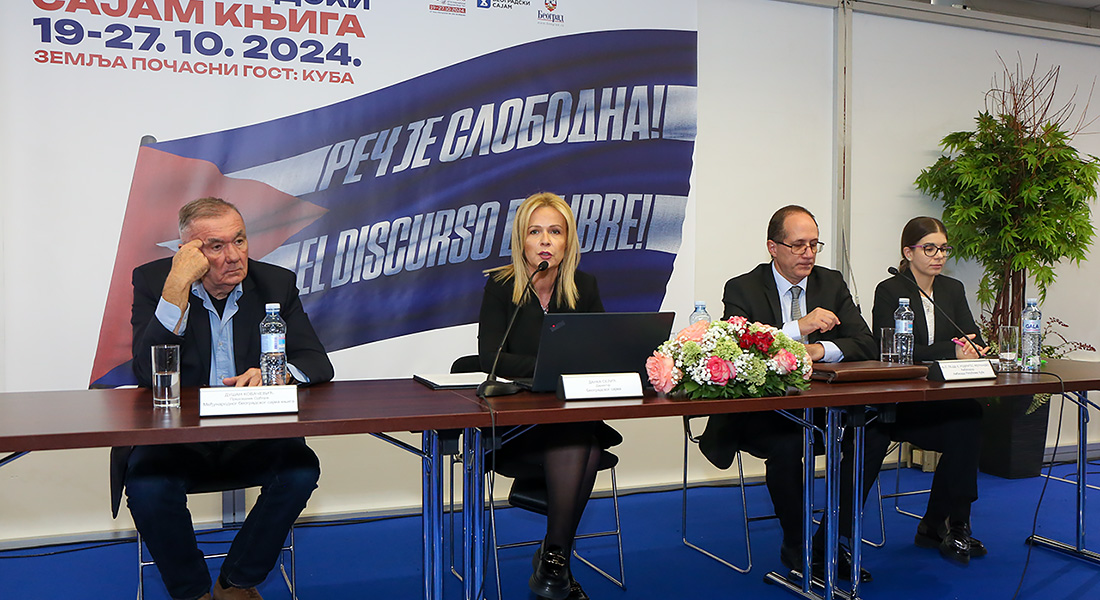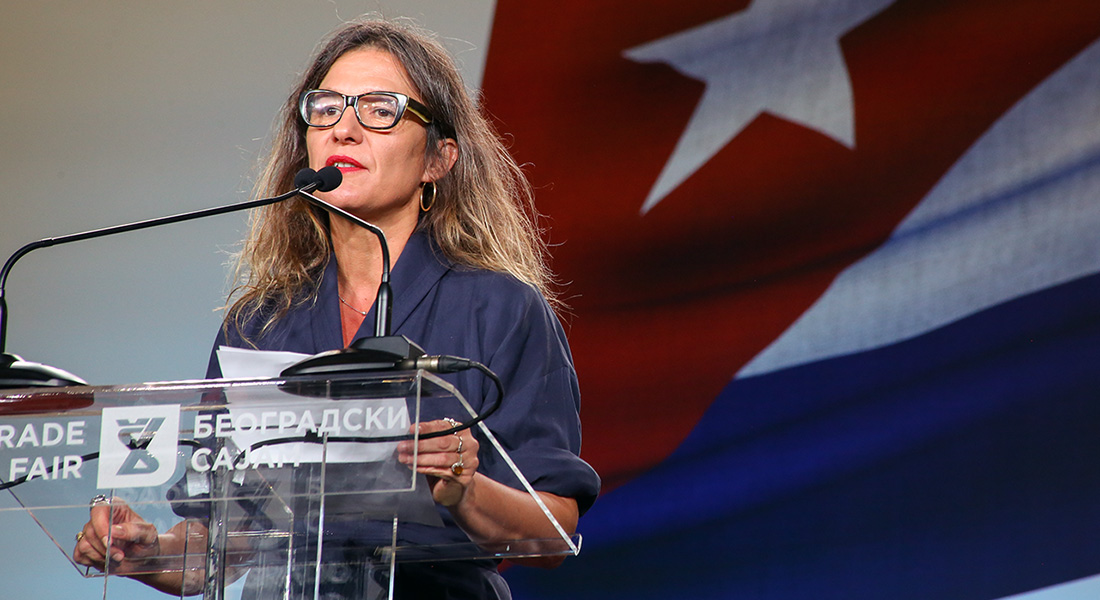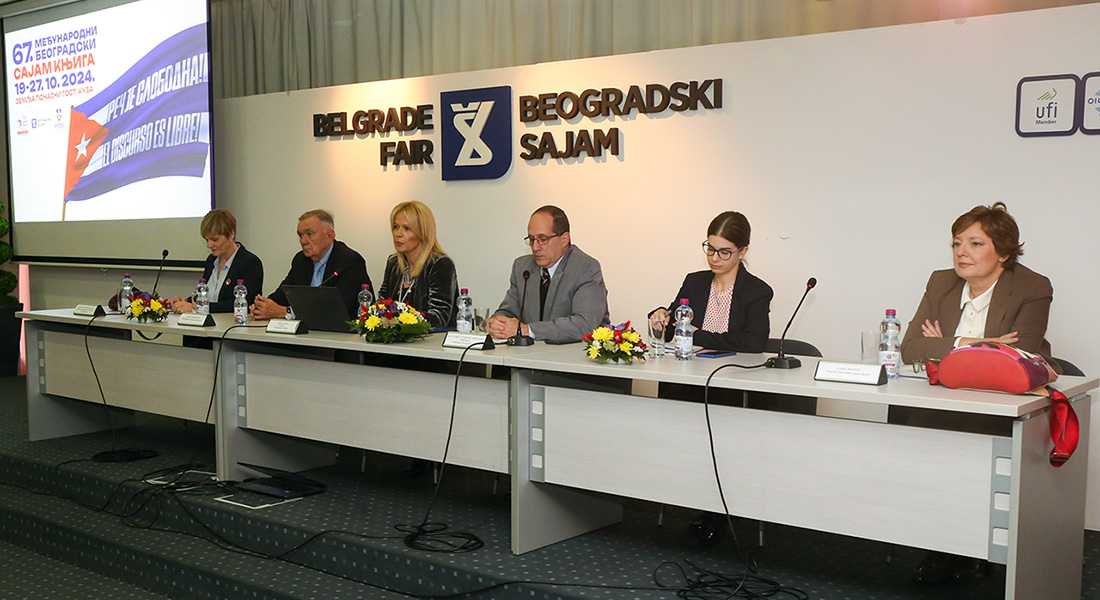The 66th International Belgrade Book Fair, the most representative literary event in this part of Europe, began on Saturday, October 21, 2023. Under the slogan “Long Live Books,” more than 400 domestic and foreign publishers, writers, visitors, and all other admirers of literature and the universal values of literary creation will be able to enjoy the beauty of words and numerous fair programs until Sunday, October 29.
This year, the guest of honour country is the French Republic. The guest of honour has the opportunity to present authors from their country, translators, publishers, distributors, as well as all those who are connected to books in various ways.
While announcing the beginning of this reputable event, writer and publisher Vladislav Bajac passionately explained why a book is the “sum of loneliness in writing and reading.”
“The publishing industry presented through book fairs is important primarily because they are exhibitions of living pictures that connect the vast space between writing and reading. Through that enchanted space runs a path that links two houses. It’s worth remembering what is at the beginning and end of that world,” Mr. Bajac said at the beginning of his speech.
“Far away, at the very beginning of that highway of massiveness, noise, and numbers, there sits a writer in one house, alone, and – writes. The other side, the extreme, the other half… is the reader, who, just like the writer, sits alone, and – reads. Despite all the distance, it is the most intimate unity of the writer and the reader. And the most beautiful unity of opposites.
No book is truly written until it is read; no author finishes it – the reader does. The letters belong to the author, the point belongs to the reader. The reader is the echo, the reflection, the mirror of the writer. The reader’s interpretation, their own understanding, however clear the author’s messages may be, is the final chapter of the book. Thus, in every book, alongside the author’s name, there is an invisible name of the reader who, in the process of reading, first transcribes into their mind what they read and then, by interpreting it – adds their own notes. This is why perhaps some books have a few blank pages at the end. Visible or invisible.
As many readers, as many different interpretations of the same book. What a richness it is!
Judging by the world’s experience, it has turned out that writing, not just reading, is one of the most effective remedies against global calamities. The more of both, the better for literary democracy. After all, books have been written and read in times of all epidemics, poorly governed politics and states, wars, and natural disasters because they have proven to be excellent consolation, a quick and reliable deception, a secure confession chamber, steadfast support, a reliable friend, always available… And a love for a lifetime.
If there’s one thing a book desires, it’s – to last. Time is the most stringent judge of a book. When a book endures, it means it’s “sentenced” to quality. When it succeeds during the author’s lifetime, the author becomes a privileged witness to their own success in the court of time. When a book outlives the author, it enters Purgatory. When it surpasses the author, it fights Utopia. And perhaps enters Paradise. The author, from then, or actually from much earlier, is no longer important. The book is important. It has remained.
The greatest joy of future reading is the thought of the World Library of already existing magical books waiting to be discovered. The only joy that might compete with it is the thought of those even more magical ones that have yet to be written.
Books have lived, are living, and will continue to live.
Long live books!”
On behalf of the guest of honour country, the participants of the Fair were greeted by Mathias Énard, one of the most beloved French authors and one of the most knowledgeable about the history and culture of our region:
“Ladies and gentlemen, dear readers, dear people of Belgrade and other settlements on the planet,
First of all, thank you for allowing me the honor of opening the Book Fair in Belgrade, a city I hold dear and which is the capital of a country I love.
Authors are always proud to see their books translated; knowing that our texts can overcome language barriers thanks to a translator is a tremendous joy. Our books lead their authors like dogs on a leash. In these times when the sound of bombs echoes and the cries of victims resound, when we feel that our hopes are shattered in war, in the omnipresence of destruction, it is comforting to discover that our words can still cross borders. Books can always travel, unlike many people on this planet. There is some sad hope in this sentence. Or absolute despair. We are here to celebrate the book. To celebrate thought and creation. And from afar, the echoes of battles reach us.
In the face of political uncertainties, conflicts, and crises, can books still be of help to us? Can they be our refuge? What can a human being of the 21st century find in a novel, in a world threatened with collapse, in which war has almost destroyed his home or conflict has torn it apart? The novel, as Alexander Dumas spoke of it, unleashes adventurous horses – and indeed, the novel leads to the unknown; the novel takes us on a journey. The novel allows us to leave the world. To those who live on fiction, truth is repugnant, Victor Hugo said. Many today live on fiction. But the novel, literature, is something more than fiction, more than entertainment that distances us from the harshness of the world, something that places a veil of illusion between us and reality. The novel, literature, is the opening of a space for thought. In the novel, perhaps we do not find the consolation of philosophy, the expanses of metaphysics, although the diversity of the novel’s space is unmatched.
Literature restores the complexity of the world. Literature, books, stand against the immediacy of television, constant information, the hypnotic dictatorship of the present. Books open to us another time, another world, where we cease to be anesthetized monkeys, where the present no longer clouds our vision, but we once again become thinking beings, citizens. A book is knowledge, thought, freedom: a different rhythm, a different planet. Literature is also the possibility of approaching others, getting to know the diversity of human experiences, different societies – and translation is a key asset for that. Translation allows us to avoid focusing our vision of the world solely on ourselves, on the small universe that immediately surrounds us. Saint-Germain-des-Prés, Paris, France – that’s what the universe of my growing up would have been if it weren’t for translation. A closed world, interested solely in what is close to it.
Certainly, a language like French carries within itself tremendous diversity, what we call Francophonie, which spans five continents; Francophonie is a space that allows the world to force the French language to open itself, to transform, but what truly enables literature in France to reflect the diversity of the planet is translation. Translation saves us, even from the solitude of blindness. The connections between nations can be interpreted through their mutual translations.
Since the 19th century, France and Serbia have woven literary connections through translation. Yugoslav, as well as Serbian poetry and novels, have achieved great success in France, and other way round – unfortunately, there are never enough translations. The choice of works to be translated and the languages from which they are translated point to the networks of contemporary political dominance: in France, far more is translated from English, and even Spanish, than from Serbian or German; but also far more from Serbian and German than from Arabic or Persian. Nevertheless, translations are made, and Serbian novels reach French readers, thanks to exceptional translators. Certainly – not enough, not all. We can always view the glass as half full or half empty – today, let’s celebrate the fact that there is something in it and raise a glass of translation to the health of literature! Happy book fair to you!!”
An exceptional cultural event – the Confluences manifestation – is organized by France as an exchange in the field of culture between two nations, featuring more than 20 authors and significant figures from the world of French art and culture.
In addition to France, the guest of honour, and publishers from Serbia, the 66th International Belgrade Book Fair will feature publishers from Romania, Montenegro, Croatia, Bosnia and Herzegovina (the Republic of Srpska), Italy, Greece, Turkey, Germany, Belarus, the Russian Federation, China, Iran, and Egypt.
Apart from presenting authors from France and programs at the exhibitors’ stands, there will be dozens of panel discussions organized during the fair. A number of our writers, theorists, editors, art editors, translators, publishers, critics, and librarians will participate in the program. Foreign guests, participants in the Book Fair program, include Kate Moss (United Kingdom), João Tordo (Portugal), and Simon Sebag Montefiore (United Kingdom).
The fair’s program sections are organized thematically. For instance, the “Writers and Interpretations” section involves presenting our authors of different generations and poetics through a dialogue between the author and a theorist or critic who deals with their work.
In the “Dialogues” section, writers will respond to questions about literature and art.
The program section “Classics” includes discussions on important anniversaries and birthdays of Radoje Domanović, Miloš Crnjanski, Franz Kafka, Slobodan Selenić, Jovan Hristić, Aleksandar Ristović, as well as programs dedicated to the works of David Albahari and Milan Kundera.
“Literature on the Stage” is a section that will focus on literature in visual and performing arts and media.
The section “How to Find a Good Book” features a full-day program organized by France, the guest of honour country, and the Association of Professional Publishers of Serbia (UPIS). This section also includes discussions on book design and librarianship.
“Thinking About a Book” is a program section that opens up various topics, from models of popularizing science to discussions about the relationship between artificial intelligence and books, as well as questions related to the language of contemporary literary criticism.
The program dedicated to children’s literature includes a tribute to Jovan Jovanović Zmaj. Writers and interpreters of children’s literature will discuss various themes, such as how favorite books are written, how they help overcome fear and foster empathy in the youngest readers.
The exhibition “Design as Destiny” presents posters and books by Slobodan Mašić.
The traditional “School Day” will be organized on Thursday, October 26th. The School Day is intended for organized visits by pupils, teachers, school librarians, students, and professors. Publishers prepare special programs for both younger and older students, as well as their teachers and lecturers.
As part of the 66th International Belgrade Book Fair, traditional awards and recognitions will be presented, and the annual publishing production will be evaluated in various categories: Publisher of the Year, Publishing Venture of the Year, Children’s Book of the Year, Publisher from the Serbian diaspora, Contribution to the field of science, Most Beautiful Book, Most Beautiful Children’s Book, Young Designer…
The working hours of the Book Fair are:
October 21-22: 10:00 AM – 9:00 PM
October 23-26: 10:00 AM – 8:00 PM
October 27-29: 10:00 AM – 9:00 PM
Individual tickets are 350 RSD, group tickets 250 RSD, family tickets 1,000 RSD, and car parking (per hour) is 150 RSD.


